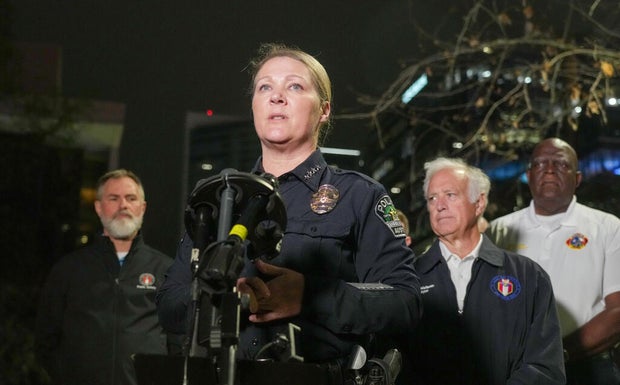News
7 injured, including 4 children, at Nebraska home after neighbor opens fire

Seven people, including four children, were shot by a neighbor at a Nebraska home Friday evening, according to authorities, who said the crime could potentially be racially motivated.
At about 4:33 p.m., multiple 911 calls were made to report an active shooter situation on the 1200 block of Crestline Drive in Crete, a town in southeastern Nebraska, Nebraska State Patrol Col. John Bolduc said at a news briefing Saturday. Local officers and deputies responded to the scene, where they could still hear gunshots, including a single gunshot that came from a home across the street.
About 15 people were at the home at the time of the shooting, most of whom were outside in the yard, according to a news release. At least one of the victims was inside the home. It’s not clear at this time who was a resident and who was visiting.
“It was quickly determined that all gunfire had come from a single residence at 1810 Parkland Street,” Bolduc said, adding that a SWAT team responded to the home to apprehend what was believed to be “a barricaded subject.”
The SWAT team entered the home at about 6:40 p.m., where it found the 74-year-old suspect, Billy Booth, dead with a self-inflicted gunshot wound. A shotgun was found near Booth’s body, Bolduc said.
“Preliminary investigation shows that all rounds fired by Booth came from inside of his house,” Bolduc said. “Investigators are still actively working this investigation to understand everything that occurred, but at this point, we don’t believe there was any verbal contact between the suspect and any of the victims in the moments that led up to the shooting.”
Three of the victims found on the scene were adults, ranging in age from 22 to 43. Four were children, ranging in age from 3 to 10, Bolduc said. All of the victims are believed to be Hispanic, according to Crete Police Chief Gary Young Jr.
Six victims were taken to the hospital initially and a seventh realized he was injured later that evening, according to the state patrol. Four have been released from the hospital and three are still receiving care — two of whom are in a children’s hospital. All are expected to survive.
There was a history between the suspect and the victims’ families, according to Bolduc. The Crete Police responded to “several complaints” since 2021, most of which came from Booth regarding “driving behavior” in the neighborhood, according to Young, who also spoke at the news briefing.
“Not necessarily associated with the victims’ house, but cars driving too fast in the neighborhood, improper parking, nuisance properties, quality-of-life type issues,” Young said. “There was a single report from the victims that the suspect had flipped them off, told them to ‘Go home’ or ‘back to where they came from,’ to ‘Speak English.’”
A responding officer who interviewed the family and the suspect at the time was willing to escalate the case, but the family declined, saying they would contact police, Young said.
“That resolved the situation, so we had no further contact,” Young said.
When asked if there could be a racial element to the shooting, Young said, “There could be, we don’t know.”
“Certainly the context of ‘Go home’ and ‘Speak English’ lends itself to that,” he said.
A motive is still under investigation, Young said.
State patrol said they were on the scene of “an active situation” on the east side of Crete Friday evening and warned the public to “stay clear of the area.”
“The active situation has been resolved. There is no threat to the public,” state patrol posted on X an hour later.
Authorities are asking anyone with information on the case to come forward. The shooting remains under investigation.

News
Satellite images provide view inside Iran at war

Smoke rises over Konarak naval base in southern Iran on Sunday. The base was one of hundreds of targets of U.S. and Israeli forces throughout the country.
Planet Labs PBC
hide caption
toggle caption
Planet Labs PBC
Commercial satellite images are providing a unique look at the extent of damage being done to Iran’s military facilities across the country.
The U.S. and Israeli military campaign opened with a daytime attack that struck Iranian leadership in central Tehran. Smoke was still visible rising from Ayatollah Ali Khamenei’s compound following the attack that killed the supreme leader.

An image by the company Airbus taken on Saturday shows the aftermath of an Israeli strike on Iran’s Leadership House in central Tehran. Iran’s Supreme Leader Ayatollah Ali Khamenei was killed in the opening wave of attacks.
Pléiades Neo (c) Airbus DS 2026
hide caption
toggle caption
Pléiades Neo (c) Airbus DS 2026
Israel and the U.S. have gone on to strike targets across the country. Reports on social media indicate that there have been numerous military bases and compounds attacked all over Iran, and Iran has responded with attacks throughout the Middle East.
U.S. forces have also been striking at Iran’s navy. In a post on his social media platform, President Trump said that he had been briefed that U.S. forces had sunk nine Iranian naval vessels. U.S. Central Command did not immediately confirm that number but it did say it had struck an Iranian warship in port.

An image captured on Saturday shows a ship burning at Iran’s naval base at Konarak.
Satellite image ©2026 Vantor
hide caption
toggle caption
Satellite image ©2026 Vantor
Numerous satellite images show burning vessels at Konarak naval base in southern Iran. Images also show damage to a nearby airbase where hardened hangers were struck by precision munitions.

Hardened aircraft shelters at Konarak airbase were struck with precision munitions.
Satellite image ©2026 Vantor
hide caption
toggle caption
Satellite image ©2026 Vantor
And there was extensive damage at a drone base in the same area. Iran has launched numerous drones and missiles toward Israel and U.S. military installations in Bahrain, Kuwait and Qatar. Many drones have been intercepted but videos on social media show that some have evaded air defenses and caused damage in nearby Gulf countries. In Dubai, debris from an Iranian drone damaged the iconic Burj Al Arab, according to a statement from Dubai’s government.

Buildings at an Iranian drone base at Konarak were destroyed in the strikes.
Satellite image ©2026 Vantor
hide caption
toggle caption
Satellite image ©2026 Vantor
Iran’s most powerful weapons are its long-range missiles. The Iranian Revolutionary Guards have hidden the missiles deep inside mountain tunnels. Images taken Sunday in the mountains of northern Iran indicate that some of those tunnels were hit in a wave of strikes.
Following Khamenei’s death, Iran declared 40 days of mourning. Satellite images showed mourners gathering in Tehran’s Enghelab square on Sunday.
Iranian Foreign Ministry Spokesperson Esmail Baghaei told NPR on Sunday that Iran will continue to fight “foreign aggression, foreign domination.”
A White House official told NPR that Trump plans to talk to Iran’s interim leadership “eventually,” but that for now, U.S. operations continue in the region “unabated.”

A large crowd of mourners fill Enghelab Square in Tehran on Sunday, following the death of Iran’s Supreme Leader Ayatollah Ali Khamenei, who was killed in an Israeli airstrike.
Satellite image ©2026 Vantor
hide caption
toggle caption
Satellite image ©2026 Vantor
News
Video: What the Texas Primary Battle Means for the Midterms

new video loaded: What the Texas Primary Battle Means for the Midterms
By J. David Goodman, Alexandra Ostasiewicz, June Kim and Luke Piotrowski
March 1, 2026
News
Mass shooting at Austin, Texas bar leaves at least 3 dead, 14 wounded, authorities say

Gunfire rang out at a bar in Austin, Texas, early Sunday and at least three people were killed, the city’s police chief said.
Austin Police Chief Lisa Davis told reporters the shooter was killed by officers at the scene.
Fourteen others were hospitalized and three were in critical condition, Austin-Travis County EMS Chief Robert Luckritz said.
“We received a call at 1:39 a.m. and within 57 seconds, the first paramedics and officers were on scene actively treating the patients,” Luckritz said.
There was no initial word on the shooter’s identity or motive.
Davis noted how fortunate it was that there was a heavy police presence in Austin’s entertainment district at the time, enabling officers to respond quickly as bars were closing.
“Officers immediately transitioned … and were faced with the individual with a gun,” Davis said. “Three of our officers returned fire, killing the suspect.”
She called the shooting a “tragic, tragic” incident.
Austin Mayor Kirk Watson said his heart goes out to the victims, and he praised the swift response of first responders.
“They definitely saved lives,” he said.
Davis said federal law enforcement is aiding the investigation.
-

 World4 days ago
World4 days agoExclusive: DeepSeek withholds latest AI model from US chipmakers including Nvidia, sources say
-

 Massachusetts4 days ago
Massachusetts4 days agoMother and daughter injured in Taunton house explosion
-

 Montana1 week ago
Montana1 week ago2026 MHSA Montana Wrestling State Championship Brackets And Results – FloWrestling
-

 Denver, CO4 days ago
Denver, CO4 days ago10 acres charred, 5 injured in Thornton grass fire, evacuation orders lifted
-

 Louisiana7 days ago
Louisiana7 days agoWildfire near Gum Swamp Road in Livingston Parish now under control; more than 200 acres burned
-

 Technology1 week ago
Technology1 week agoYouTube TV billing scam emails are hitting inboxes
-

 Technology1 week ago
Technology1 week agoStellantis is in a crisis of its own making
-

 Politics1 week ago
Politics1 week agoOpenAI didn’t contact police despite employees flagging mass shooter’s concerning chatbot interactions: REPORT


















